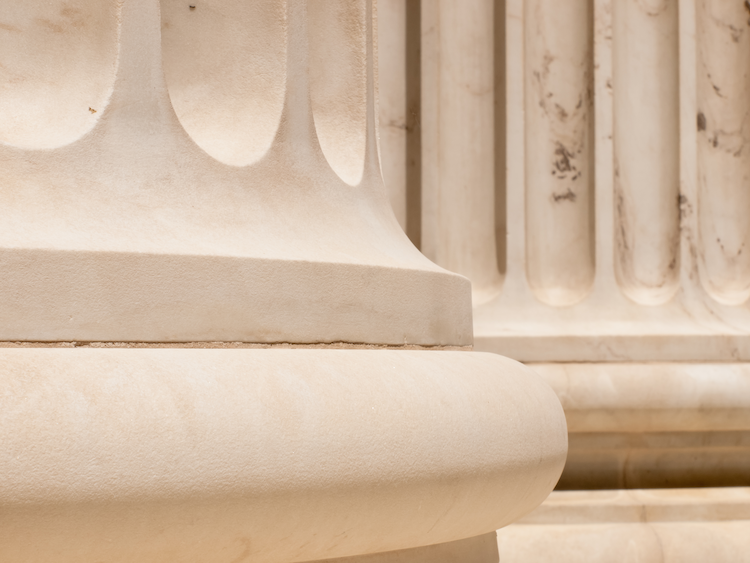SCOTUS Considers Pair of High-Profile First Amendment Cases

The U.S. Supreme Court heard oral arguments in six cases last week, with two potential First Amendment blockbusters before the Court.
In National Rifle Association of America v. Vullo, the justices considered the NRA’s free speech claims against the former head of New York’s Department of Financial Services.
Meanwhile, in Murthy v. Missouri, the justices addressed when the federal government’s efforts to influence social media sites’ content-moderation decisions may run afoul of the First Amendment.
National Rifle Association of America v. Vullo
As discussed in greater detail here, in National Rifle Association of America v. Vullo, the NRA alleges that Maria T. Vullo, the former Superintendent of the New York State Department of Financial Services (DFS), used her regulatory power to threaten NRA business partners and coerce them into disassociating with the NRA, in violation of its rights to free speech and equal protection.
The NRA cites statements Vullo made in the wake of the tragic school shooting in Parkland, Florida, against gun violence via industry-directed “guidance letters” and a press statement issued by the New York State Governor’s Office. She called upon banks and insurance companies doing business in New York to consider the risks, including “reputational risks,” that might arise from doing business with the NRA or “similar gun promotion organizations.”
After numerous entities cut ties with the NRA, the NRA filed suit. The Second Circuit Court of Appeals dismissed the free speech claims, determining that Vullo is entitled to qualified immunity. In reaching its decision, the appeals court rejected the NRA’s claim that Vullo engaged in unconstitutionally threatening or coercive conduct.
The U.S. Supreme Court granted certiorari on November 3, 2023. The Court agreed to decide the following question: Whether the First Amendment allows a government regulator to threaten regulated entities with adverse regulatory actions if they do business with a controversial speaker, as a consequence of (a) the government’s own hostility to the speaker’s viewpoint or (b) a perceived “general backlash” against the speaker’s advocacy.
During oral arguments, the two sides offered differing viewpoints of Vullo’s actions. The NRA contended that her actions amounted to coercion, characterizing it as “a campaign by the state’s highest political officials to use their power to coerce a boycott of a political advocacy organization because they disagreed with its advocacy.” Meanwhile, Vullo’s attorney argued that she was enforcing the law and that the NRA’s suit could encourage others to use the First Amendment to thwart valid enforcement actions.
Murthy v. Missouri
In Murthy v. Missouri, the justices will decide whether to restrict the government’s ability to communicate with social media companies about their content moderation policies. The dispute arose from efforts by the Biden Administration and several other federal agencies to combat the spread of “misinformation” on social media on issues such as COVID-19. The Plaintiffs—three doctors, a news website, a healthcare activist, and two states — had posts and stories removed or downgraded by the platforms.
A federal district court agreed that the federal government violated the First Amendment’s right to free speech by “coercing” or “significantly encouraging” social media sites’ content-moderation decisions. The court issued an injunction restricting the Biden Administration’s contacts with platforms on a range of topics.
The justices agreed to hear the case and will decide the following questions: (1) Whether respondents have Article III standing; (2) Whether the government’s challenged conduct transformed private social-media companies’ content-moderation decisions into state action and violated respondents’ First Amendment rights; and (3) Whether the terms and breadth of the preliminary injunction are proper.
Oral arguments were held on March 18, 2024, during which several justices raised concerns about broadly restricting the government’s communications with social media platforms. “Some might say that the government actually has a duty to take steps to protect the citizens of this country, and you seem to be suggesting that that duty cannot manifest itself in the government encouraging or even pressuring platforms to take down harmful information,” Justice Ketanji Brown Jackson said to Louisiana solicitor general Benjamin Aguiñaga.
“I’m really worried about that, because you’ve got the First Amendment operating in an environment of threatening circumstances from the government’s perspective, and you’re saying the government can’t interact with the source of those problems.”
Decisions in both cases are expected before the end of the term this summer. Please check back for updates.
Previous Articles
SCOTUS Decision in Bowe v. United States Is First of the 2026 Term
by DONALD SCARINCI on February 5, 2026
In Bowe v. United States, 607 U.S. ___ (2026), the U.S. Supreme Court held that Title 28 U.S.C. § ...
SCOTUS Rules State Can’t Immunize Parties from Federal Civil Liability
by DONALD SCARINCI on January 29, 2026
In John Doe v. Dynamic Physical Therapy, LLC, 607 U.S. ____ (2025) the U.S. Supreme Court held that...
Supreme Court to Address Racial Discrimination in Jury Selection
by DONALD SCARINCI onWhile the U.S. Supreme Court has concluded oral arguments for the year, it continues to add cases t...
The Amendments
-
Amendment1
- Establishment ClauseFree Exercise Clause
- Freedom of Speech
- Freedoms of Press
- Freedom of Assembly, and Petitition
-
Amendment2
- The Right to Bear Arms
-
Amendment4
- Unreasonable Searches and Seizures
-
Amendment5
- Due Process
- Eminent Domain
- Rights of Criminal Defendants
Preamble to the Bill of Rights
Congress of the United States begun and held at the City of New-York, on Wednesday the fourth of March, one thousand seven hundred and eighty nine.
THE Conventions of a number of the States, having at the time of their adopting the Constitution, expressed a desire, in order to prevent misconstruction or abuse of its powers, that further declaratory and restrictive clauses should be added: And as extending the ground of public confidence in the Government, will best ensure the beneficent ends of its institution.





